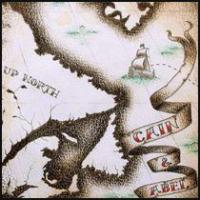If you have not yet listened to Cain & Abel, it's possible that neither the name of the band nor the title of the album are much encouragement. The band's moniker might lead one to believe they play worship hymns for Sunday mornings (they don't), while the album title reveals that they are from the land of hockey, five-pin bowling, and Aubin. Who wants that?
If you do end up giving Up North some attention, you'll learn that Cain & Abel is a Canadian quintet founded by Peter van Helvoort (formerly of Most Serene Republic), and the band utilizes their native country as the basis for the album's concept. Yes, it is a concept album, and it could easily draw comparisons to a few other concept albums of recent years, which can either be a good or bad thing, depending on your fondness for the style of music.
Up North is the story of Canada from the moment the nation's history begins in textbooks, yet told in the post-modern perspective of the marginalized First Nations people. It begins at the first sight of European voyagers, follows through different stages of contact and conflict, until it reaches the inevitable conclusion of a stolen land and disenfranchised people. This is one of the most intriguing aspects of the album, as the lyrics read like a tragic narrative, following a family through these traumatic early years as they lose their footing and struggle to regain it within their native land. This narrative is quite cohesive, the narrator often found lamenting the loss of land and nature in exchange for material objects, addiction, and disease. "Who's discovering whom?" he asks on "I'm Drinking Demons," before answering his own question: "On this expedition set from sea, I'm finding you in me. I'm drinking demons; I've lost seasons, sons and sense. Waking up with a musket, instead of a reason to be."
Of course, a well-constructed concept means little if the music isn't there to back it up. The band puts forth a strong effort, though there is a bit of room for improvement. Up North contains a lot of variety within it, from the upbeat and brash "Good Morning Son," complete with gang vocals, to "Our Father," a slow-moving and heartfelt dialogue between father and son, to "Nature Speaks with Me," an indie pop inspired piece. There is also a unique assortment of instruments on the disc, including a cello, trumpet, violin, banjo, and upright bass that blend well with the standard instruments present. However, even though there is a lot of variety within the album, the band is not doing enough to distinguish itself from its contemporaries -- it just seems to blend in with them. A little more energy could go a long way as well, as there are times in the middle that seem a little too well-planned, and these moments lack the emotion that the disc's topic should garner.
Even with these minor hiccups, the band puts forth an interesting sophomore album that manages to use its unique premise to combine an intriguing narrative with a historical perspective that is too often left untold. A refreshing addition to the genre, Up North is definitely catchy, clever, and cohesive, but it is still a few fries short of poutine.
